| Listing 1 - 10 of 10 |
Sort by
|

ISBN: 0674041402 9780674041400 0674034864 9780674034860 9780674034860 0674023358 9780674023352 0674266226 Year: 2007 Publisher: Cambridge, MA : Harvard University Press,
Abstract | Keywords | Export | Availability | Bookmark
 Loading...
Loading...Choose an application
- Reference Manager
- EndNote
- RefWorks (Direct export to RefWorks)
Katherine Nelson re-centers developmental psychology with a revived emphasis on development and change, rather than foundations and continuity. Nelson argues that a child's entrance into the community of minds is a gradual process with enormous consequences for child development, and the adults that they become.
Child psychology. --- Child psychology --- Cognition in children. --- Human information processing in children. --- Human information processing (Child psychology) --- Information processing in children --- Cognition in children --- Cognition (Child psychology) --- Thought and thinking in children --- Behavior, Child --- Child behavior --- Child study --- Children --- Pediatric psychology --- Child development --- Developmental psychology --- Social aspects. --- Psychology
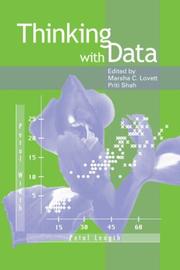
ISBN: 9780805854213 9780805854220 0805854215 0805854223 9780203810057 9781136679384 9781136679421 9781136679438 Year: 2007 Publisher: New York, N.Y. Erlbaum
Abstract | Keywords | Export | Availability | Bookmark
 Loading...
Loading...Choose an application
- Reference Manager
- EndNote
- RefWorks (Direct export to RefWorks)
Quantitative methods in social research --- Artificial intelligence. Robotics. Simulation. Graphics --- Cognition --- Cognitive learning --- Distributed cognition --- Human information processing --- Multivariate analysis --- Thought and thinking --- Uncertainty (Information theory) --- Methoden en technieken --- Data processing --- statistiek --- statistiek.
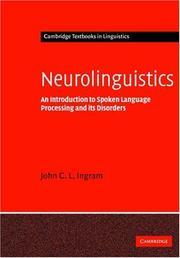
ISBN: 9780521796408 9780521791908 0521791901 0521796407 9780511618963 0511354398 9780511354397 0511353812 9780511353819 9780511649219 0511649215 0511618964 1107174201 1282389696 9786612389696 0511645120 051155723X Year: 2007 Publisher: Cambridge, UK ; New York : Cambridge University Press,
Abstract | Keywords | Export | Availability | Bookmark
 Loading...
Loading...Choose an application
- Reference Manager
- EndNote
- RefWorks (Direct export to RefWorks)
What biological factors make human communication possible? How do we process and understand language? How does brain damage affect these mechanisms, and what can this tell us about how language is organized in the brain? The field of neurolinguistics seeks to answer these questions, which are crucial to linguistics, psychology and speech pathology alike. This textbook, first published in 2007, introduces the central topics in neurolinguistics: speech recognition, word and sentence structure, meaning, and discourse - in both 'normal' speakers and those with language disorders. It moves on to provide a balanced discussion of key areas of debate such as modularity and the 'language areas' of the brain, 'connectionist' versus 'symbolic' modelling of language processing, and the nature of linguistic and mental representations. Making accessible over half a century of scientific and linguistic research, and containing extensive study questions, it will be welcomed by all those interested in the relationship between language and the brain.
Neurolinguistics --- Speech perception --- Aphasia --- Human information processing --- Etiolog --- 800 --- 800 Taalwetenschap. Taalkunde. Linguistiek --- Taalwetenschap. Taalkunde. Linguistiek --- Speech recognition --- Auditory perception --- Psycholinguistics --- Speech --- Neuro-linguistics --- Biolinguistics --- Higher nervous activity --- Neuropsychology --- Information processing, Human --- Bionics --- Information theory in psychology --- Perception --- Brain --- Language disorders --- Speech disorders --- Etiology --- Diseases --- Pragmatics --- Neurolinguistics. --- Speech perception. --- Human information processing. --- Etiology. --- Neurolinguistique --- Perception de la parole --- Aphasie --- Information, Traitement de l', chez l'homme --- Etiologie --- Psycholinguistics. --- Language, Psychology of --- Language and languages --- Psychology of language --- Linguistics --- Psychology --- Thought and thinking --- Psychological aspects --- Arts and Humanities --- Language & Linguistics --- Aphasia - Etiology --- Aphasia - Etiolog --- Langage --- Processus cognitif --- Audition --- trouble --- Neurolinguistique.
Book
ISBN: 1280937505 9786610937509 0387719784 0387719776 1441944222 Year: 2007 Publisher: New York : Springer,
Abstract | Keywords | Export | Availability | Bookmark
 Loading...
Loading...Choose an application
- Reference Manager
- EndNote
- RefWorks (Direct export to RefWorks)
Spatial Processing in Navigation, Imagery and Perception serves as a state-of-the-art platform, on which the very latest developments in spatial processing are presented. Spatial processing is centrally involved in almost any cognitive function and the neural underpinnings of spatial functions are much more complex than they have been conceived before. Studying spatial processing helps to explore how basic cognitive functions operate such as language, attention, perception, movement control and mental imagery. The processing of spatial information is distributed in complex cortical and sub-cortical structures and we are now in a position to better understand the underlying neuroanatomy and neurophysiology. This is made possible by the advent of novel techniques such as structural and functional in vivo anatomy, modeling, and sophisticated behavioral research tools. Modern neuroscientific techniques have been in many ways the catalyst of this research but there is also a revival of behavioral methods used in studies on spatial processing. It is in fact the fruitful combination of both the neuroscientific and behavioral approaches why this exciting field has progressed so far and is still progressing for many years to come. Research on spatial processing is not only restricted to basic science but rather has important applied implications. It is tremendously important to know how the human brain is accomplishing spatial tasks in real life scenarios such as driving a car, orienting oneself in large scale cities, postural control or playing various sports like baseball, soccer or tennis. Moreover, knowing more about plasticity and training related influences on spatial functions will have a huge impact on how to efficiently insert new technologies in everyday life. The findings presented in Spatial Processing in Navigation, Imagery and Perception emerge from different disciplines such as cognitive neuroscience, cognitive psychology, neuropsychology, neuroanatomy, computer science and robotics. The reader will learn to see several connections across these disciplines. Chapter authors are the most respected and internationally renowned researchers in the field. This book will be useful for experimental scientists, clinicians and graduate students.
Human information processing. --- Space perception. --- Information processing, Human --- Bionics --- Information theory in psychology --- Perception --- Spatial perception --- Spatial behavior --- Figure-ground perception --- Geographical perception --- Neurosciences. --- Consciousness. --- Neurobiology. --- Psychology, clinical. --- Cognitive Psychology. --- Neuropsychology. --- Neurosciences --- Apperception --- Mind and body --- Philosophy --- Psychology --- Spirit --- Self --- Neural sciences --- Neurological sciences --- Neuroscience --- Medical sciences --- Nervous system --- Cognitive psychology. --- Neurophysiology --- Psychophysiology --- Psychology, Cognitive --- Cognitive science
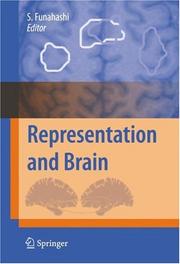
ISBN: 9784431730200 9784431730217 4431730206 443199825X 9786612236273 128223627X 4431730214 Year: 2007 Publisher: Tokyo Springer
Abstract | Keywords | Export | Availability | Bookmark
 Loading...
Loading...Choose an application
- Reference Manager
- EndNote
- RefWorks (Direct export to RefWorks)
How is information represented in the nervous system? How is that information manipulated and processed? These are some of the more important and challenging questions for neuroscientists and psychologists today. Understanding brain functions, especially the neural mechanisms of higher cognitive processes such as thinking, reasoning, judging, and decision making, are the subjects covered by the research in the chapters of this book. They describe recent progress in four major research areas: visual functions, motor functions, memory functions, and prefrontal functions. Readers will obtain an excellent idea of how the nervous system internally represents the outer world, how the nervous system constructs images or schemas to perceive the outer world or react to the environment, and how the nervous system processes information using internal representations - topics that are at the forefront of brain science today.
Cognitive psychology --- Physiology of nerves and sense organs --- Biomedicine. --- Neurosciences. --- Cognitive Psychology. --- Behavioural Sciences. --- Psychiatry. --- Medicine. --- Animal behavior. --- Consciousness. --- Médecine --- Neurosciences --- Psychiatrie --- Animaux --- Conscience --- Moeurs et comportement --- Neural circuitry. --- Neural circuitry --- Brain --- Cognition --- Human information processing --- Information Theory --- Physiology --- Neural Pathways --- Mental Processes --- Information Science --- Biological Science Disciplines --- Central Nervous System --- Nervous System --- Anatomy --- Psychological Phenomena and Processes --- Natural Science Disciplines --- Disciplines and Occupations --- Psychiatry and Psychology --- Neurology --- Neuroscience --- Medicine --- Human Anatomy & Physiology --- Health & Biological Sciences --- Brain. --- Cognition. --- Human information processing. --- Information processing, Human --- Cerebrum --- Mind --- Circuitry, Neural --- Circuits, Neural --- Nerve net --- Nerve network --- Neural circuits --- Neurocircuitry --- Neuronal circuitry --- Behavioral sciences. --- Cognitive psychology. --- Behavioral Sciences. --- Bionics --- Information theory in psychology --- Perception --- Psychology --- Central nervous system --- Head --- Electrophysiology --- Nervous system --- Neural networks (Neurobiology) --- Reflexes --- Medicine and psychology --- Mental health --- Psychology, Pathological --- Animals --- Animals, Habits and behavior of --- Behavior, Animal --- Ethology --- Animal psychology --- Zoology --- Ethologists --- Psychology, Comparative --- Apperception --- Mind and body --- Philosophy --- Spirit --- Self --- Neural sciences --- Neurological sciences --- Medical sciences --- Behavior --- Psychology, Cognitive --- Cognitive science
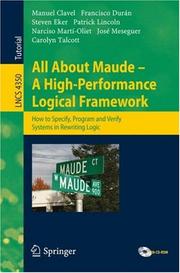
ISSN: 03029743 ISBN: 9783540719403 3540719407 3540719997 Year: 2007 Volume: 4350 Publisher: Berlin: Springer,
Abstract | Keywords | Export | Availability | Bookmark
 Loading...
Loading...Choose an application
- Reference Manager
- EndNote
- RefWorks (Direct export to RefWorks)
This book gives a comprehensive account of Maude, a language and system based on rewriting logic. Many examples are used throughout the book to illustrate the main ideas and features of Maude, and its many possible uses. Maude modules are rewrite theories. Computation with such modules is - cient deduction by rewriting. Because of its logical basis and its initial model semantics,aMaudemodulede?nesaprecisemathematicalmodel.Thismeans that Maude and its formal tool environment can be used in three, mutually reinforcing ways: • as a declarative programming language; • as an executable formal speci?cation language; and • as a formal veri?cation system. Maude’s rewriting logic is simple, yet very expressive. This gives Maude good representational capabilities as a semantic framework to formally represent a wide range of systems, including models of concurrency, distributed al- rithms, network protocols, semantics of programming languages, and models of cell biology. Rewriting logic is also an expressive universal logic,making Maude a ?exible logical framework in which many di?erent logics and - ference systems can be represented and mechanized. This makes Maude a useful metatool to build many other tools, including those in its own formal tool environment. Thanks to the logic’s simplicity and the use of advanced semi-compilation techniques, Maude has a high-performance implementation, making it competitive with other declarative programming languages.
Computer logic. --- Rewriting systems (Computer science) --- Human information processing. --- Logique informatique --- Systèmes de réécriture (Informatique) --- Information, Traitement de l', chez l'homme --- Maude (Computer program language) --- Computer logic --- Human information processing --- Computer Science --- Engineering & Applied Sciences --- Information Technology --- Computer Science (Hardware & Networks) --- Computer science. --- Computer programming. --- Software engineering. --- Programming languages (Electronic computers). --- Mathematical logic. --- Artificial intelligence. --- Computer Science. --- Programming Languages, Compilers, Interpreters. --- Programming Techniques. --- Software Engineering. --- Artificial Intelligence (incl. Robotics). --- Mathematical Logic and Formal Languages. --- AI (Artificial intelligence) --- Artificial thinking --- Electronic brains --- Intellectronics --- Intelligence, Artificial --- Intelligent machines --- Machine intelligence --- Thinking, Artificial --- Bionics --- Cognitive science --- Digital computer simulation --- Electronic data processing --- Logic machines --- Machine theory --- Self-organizing systems --- Simulation methods --- Fifth generation computers --- Neural computers --- Algebra of logic --- Logic, Universal --- Mathematical logic --- Symbolic and mathematical logic --- Symbolic logic --- Mathematics --- Algebra, Abstract --- Metamathematics --- Set theory --- Syllogism --- Computer languages --- Computer program languages --- Computer programming languages --- Machine language --- Languages, Artificial --- Computer software engineering --- Engineering --- Computers --- Electronic computer programming --- Electronic digital computers --- Programming (Electronic computers) --- Coding theory --- Informatics --- Science --- Programming --- Artificial Intelligence. --- Computer science logic --- Logic, Symbolic and mathematical --- Graph rewriting systems (Computer science) --- Term rewriting systems (Computer science) --- Programming languages (Electronic computers) --- Logic, Symbolic and mathematical.
Periodical
ISSN: 25102788 Year: 2007 Publisher: Prague : Neuroscientia,
Abstract | Keywords | Export | Availability | Bookmark
 Loading...
Loading...Choose an application
- Reference Manager
- EndNote
- RefWorks (Direct export to RefWorks)
Neurosciences --- Central nervous system --- Nervous System. --- Mental Processes. --- Nervous System Diseases. --- Central nervous system. --- Neurosciences. --- Nervous system, Central --- Nervous System Disorders --- Neurological Disorders --- Neurologic Disorders --- Disease, Nervous System --- Diseases, Nervous System --- Disorder, Nervous System --- Disorder, Neurologic --- Disorder, Neurological --- Disorders, Nervous System --- Disorders, Neurologic --- Disorders, Neurological --- Nervous System Disease --- Nervous System Disorder --- Neurologic Disorder --- Neurological Disorder --- Human Information Processing --- Information Processing, Human --- Nervous Systems --- System, Nervous --- Systems, Nervous --- Neural sciences --- Neurological sciences --- Neuroscience --- Nervous System --- Mental Processes --- Nervous System Diseases --- Nervous system --- Medical sciences --- Neurology --- Psychophysiology --- Homeostasis --- Adaptation (Physiology) --- Compensation (Physiology) --- Plasticity (Physiology) --- Ecophysiology --- Biological control systems --- Body fluids --- Physiology --- Psychophysiology. --- Neurology. --- Homeostasis. --- Medicine --- Neuropsychiatry --- Behavioral physiology --- Physiological psychology --- Physiopsychology --- Psychology, Physiological --- Somatopsychics --- Psychobiology --- Mind and body --- Diseases --- Neurologie --- Système nerveux central --- Psychophysiologie --- Homéostasie --- Adaptation (Physiologie)
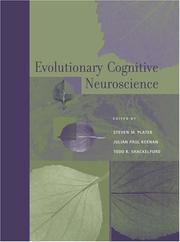
ISBN: 0262162415 9780262162418 9786612100413 026228166X 1282100416 1429455411 0262293161 9780262281669 9781282100411 9781429455411 6612100419 9780262293167 Year: 2007 Publisher: Cambridge, Mass. : MIT Press,
Abstract | Keywords | Export | Availability | Bookmark
 Loading...
Loading...Choose an application
- Reference Manager
- EndNote
- RefWorks (Direct export to RefWorks)
An essential reference for the new discipline of evolutionary cognitive neuroscience that defines the field's approach of applying evolutionary theory to guide brain-behavior investigations.
Genetic Concepts --- Genetic Phenomenon --- Genetic Process --- Concept, Genetic --- Concepts, Genetic --- Genetic Concept --- Phenomena, Genetic --- Phenomenon, Genetic --- Process, Genetic --- Processes, Genetic --- Nervous Systems --- System, Nervous --- Systems, Nervous --- Biologic Phenomena --- Biological Phenomenon --- Biological Process --- Phenomena, Biological --- Phenomena, Biologic --- Phenomenon, Biological --- Process, Biological --- Processes, Biological --- Cerebrospinal Axis --- Axi, Cerebrospinal --- Axis, Cerebrospinal --- Central Nervous Systems --- Cerebrospinal Axi --- Nervous System, Central --- Nervous Systems, Central --- System, Central Nervous --- Systems, Central Nervous --- Cognitive neuroscience --- Brain --- Evolutionary psychology --- Behavior --- Cognition --- Biological Evolution --- Cognitive Science --- Neurosciences --- Psychology --- Biological Processes --- Central Nervous System --- Behavior and Behavior Mechanisms --- Mental Processes --- Biological Science Disciplines --- Genetic Processes --- Natural Science Disciplines --- Behavioral Sciences --- Psychological Phenomena and Processes --- Biological Phenomena --- Nervous System --- Genetic Phenomena --- Psychiatry and Psychology --- Behavioral Disciplines and Activities --- Phenomena and Processes --- Anatomy --- Disciplines and Occupations --- Neuroscience --- Human Anatomy & Physiology --- Health & Biological Sciences --- Psychologic Processes and Principles --- Proxemics --- Behavioral Science --- Proxemic --- Science, Behavioral --- Sciences, Behavioral --- Natural Sciences --- Physical Sciences --- Discipline, Natural Science --- Disciplines, Natural Science --- Natural Science --- Natural Science Discipline --- Physical Science --- Science, Natural --- Science, Physical --- Sciences, Natural --- Sciences, Physical --- Biologic Sciences --- Biological Science --- Science, Biological --- Sciences, Biological --- Biological Sciences --- Life Sciences --- Biologic Science --- Biological Science Discipline --- Discipline, Biological Science --- Disciplines, Biological Science --- Life Science --- Science Discipline, Biological --- Science Disciplines, Biological --- Science, Biologic --- Science, Life --- Sciences, Biologic --- Sciences, Life --- Human Information Processing --- Information Processing, Human --- Factors, Psychological --- Psychological Factors --- Psychological Side Effects --- Psychologists --- Psychosocial Factors --- Side Effects, Psychological --- Factor, Psychological --- Factor, Psychosocial --- Factors, Psychosocial --- Psychological Factor --- Psychological Side Effect --- Psychologist --- Psychosocial Factor --- Side Effect, Psychological --- Cognitive Sciences --- Science, Cognitive --- Sciences, Cognitive --- Evolution, Biological --- Cognitive Function --- Cognitions --- Cognitive Functions --- Function, Cognitive --- Functions, Cognitive --- Encephalon --- Brains --- Encephalons --- Acceptance Process --- Acceptance Processes --- Behaviors --- Process, Acceptance --- Processes, Acceptance --- Cerebrum --- Mind --- Cognitive neuropsychology --- Evolution --- Anatomies --- Molecular Biology --- Psychologic Processes --- Psychological Processes --- Phenomena, Psychological --- Processes, Psychologic --- Processes, Psychological --- Psychological Phenomenas --- Psychological Processe --- Sociobiology --- Human evolution --- Central nervous system --- Head --- Cognitive science --- Neuropsychology --- Cognitive neuroscience. --- Evolutionary psychology. --- Evolution. --- Neurosciences cognitives --- Cerveau --- Psychologie évolutionniste. --- NEUROSCIENCE/General --- BIOMEDICAL SCIENCES/Evolution

ISBN: 156793952X 1567932568 9781567932560 9781567939521 Year: 2007 Publisher: Chicago : Washington, D.C. : Health Administration Press ; AUPHA Press,
Abstract | Keywords | Export | Availability | Bookmark
 Loading...
Loading...Choose an application
- Reference Manager
- EndNote
- RefWorks (Direct export to RefWorks)
Health services administration --- Hospitals --- Health Occupations --- Health Care --- Thinking --- Disciplines and Occupations --- Mental Processes --- Psychological Phenomena and Processes --- Psychiatry and Psychology --- Decision Making --- Health Services Administration --- Public Health --- Health & Biological Sciences --- Public Health - General --- Administration, Health Services --- Health Services --- Citizen Science --- Problem Solving --- Psychologic Processes --- Psychologic Processes and Principles --- Psychological Processes --- Phenomena, Psychological --- Processes, Psychologic --- Processes, Psychological --- Psychological Phenomenas --- Psychological Processe --- Human Information Processing --- Information Processing, Human --- Critical Thinking --- Thinking Skills --- Thought --- Thinking Skill --- Thinking, Critical --- Thoughts --- Community-Based Distribution --- Contraceptive Distribution --- Delivery of Healthcare --- Dental Care Delivery --- Distribution, Non-Clinical --- Distribution, Nonclinical --- Distributional Activities --- Healthcare --- Healthcare Delivery --- Healthcare Systems --- Non-Clinical Distribution --- Nonclinical Distribution --- Delivery of Dental Care --- Health Care Delivery --- Health Care Systems --- Activities, Distributional --- Activity, Distributional --- Care, Health --- Community Based Distribution --- Community-Based Distributions --- Contraceptive Distributions --- Deliveries, Healthcare --- Delivery, Dental Care --- Delivery, Health Care --- Delivery, Healthcare --- Distribution, Community-Based --- Distribution, Contraceptive --- Distribution, Non Clinical --- Distributional Activity --- Distributions, Community-Based --- Distributions, Contraceptive --- Distributions, Non-Clinical --- Distributions, Nonclinical --- Health Care System --- Healthcare Deliveries --- Healthcare System --- Non Clinical Distribution --- Non-Clinical Distributions --- Nonclinical Distributions --- System, Health Care --- System, Healthcare --- Systems, Health Care --- Systems, Healthcare --- Health Professions --- Health Occupation --- Health Profession --- Profession, Health --- Professions, Health --- Occupations --- Benevolent institutions --- Infirmaries --- Health facilities --- Health administration --- Health care administration --- Health care management --- Health sciences administration --- Health services management --- Medical care --- Health planning --- Public health administration --- Decision making. --- Quality control --- Standards. --- Decision making --- Standards --- organization & administration --- Administration --- Management --- Credit Assignment --- Assignment, Credit --- Assignments, Credit --- Credit Assignments --- Psychological Phenomena --- Psychology --- Health Occupations. --- Delivery of Health Care. --- Thinking. --- Occupations. --- Mental Processes. --- Psychological Phenomena. --- Psychology. --- Decision Making. --- Health Services Administration.

ISBN: 9780702036859 0702036854 9780443101816 0443101817 Year: 2007 Publisher: [Place of publication not identified] Churchill Livingstone/Elsevier
Abstract | Keywords | Export | Availability | Bookmark
 Loading...
Loading...Choose an application
- Reference Manager
- EndNote
- RefWorks (Direct export to RefWorks)
Affective and dynamic functions --- Complementary Therapies --- Medicine, East Asian Traditional --- Mental Processes --- Behavior and Behavior Mechanisms --- Psychological Phenomena and Processes --- Therapeutics --- Psychiatry and Psychology --- Medicine, Traditional --- Analytical, Diagnostic and Therapeutic Techniques and Equipment --- Culture --- Anthropology, Cultural --- Anthropology --- Social Sciences --- Anthropology, Education, Sociology and Social Phenomena --- Medicine, Chinese Traditional --- Acupuncture Therapy --- Emotions --- Mind-Body Relations, Metaphysical --- Body-Mind Relations --- Soul-Body Relations --- Mind-Body Relations (Metaphysics) --- Mind-Body Relations (Non-Physiology) --- Body Mind Relations --- Body-Mind Relation --- Metaphysical Mind-Body Relation --- Metaphysical Mind-Body Relations --- Mind Body Relations (Metaphysics) --- Mind Body Relations (Non Physiology) --- Mind Body Relations, Metaphysical --- Mind-Body Relation (Metaphysics) --- Mind-Body Relation (Non-Physiology) --- Mind-Body Relation, Metaphysical --- Relation, Body-Mind --- Relation, Metaphysical Mind-Body --- Relation, Mind-Body (Metaphysics) --- Relation, Mind-Body (Non-Physiology) --- Relation, Soul-Body --- Relations, Body-Mind --- Relations, Metaphysical Mind-Body --- Relations, Mind-Body (Metaphysics) --- Relations, Mind-Body (Non-Physiology) --- Relations, Soul-Body --- Soul Body Relations --- Soul-Body Relation --- Regret --- Feelings --- Emotion --- Feeling --- Regrets --- Acupotomy --- Acupuncture Treatment --- Pharmacoacupuncture Therapy --- Pharmacoacupuncture Treatment --- Therapy, Acupuncture --- Acupotomies --- Acupuncture Treatments --- Therapy, Pharmacoacupuncture --- Treatment, Acupuncture --- Treatment, Pharmacoacupuncture --- Acupuncture --- Chinese Traditional Medicine --- Traditional Chinese Medicine --- Traditional Tongue Assessment --- Traditional Tongue Diagnosis --- Chinese Medicine, Traditional --- Chung I Hsueh --- Traditional Medicine, Chinese --- Zhong Yi Xue --- Hsueh, Chung I --- Tongue Assessment, Traditional --- Tongue Diagnoses, Traditional --- Tongue Diagnosis, Traditional --- Traditional Tongue Assessments --- Traditional Tongue Diagnoses --- Medicine, Kampo --- Science, Social --- Sciences, Social --- Social Science --- Cultural Anthropology --- Material Culture --- Ethnography --- Culture, Material --- Ethnographies --- Material Cultures --- Qualitative Research --- Beliefs --- Cultural Background --- Cultural Relativism --- Customs --- Background, Cultural --- Backgrounds, Cultural --- Belief --- Cultural Backgrounds --- Cultural Relativisms --- Cultures --- Relativism, Cultural --- Relativisms, Cultural --- Indigenous Medicine --- Primitive Medicine --- Traditional Medicine --- Ethnomedicine --- Folk Medicine --- Folk Remedies --- Home Remedies --- Medicine, Folk --- Medicine, Indigenous --- Medicine, Primitive --- Folk Remedy --- Home Remedy --- Remedies, Folk --- Remedies, Home --- Remedy, Folk --- Remedy, Home --- Traditional Pulse Diagnosis --- Traditional Medicine Practitioners --- Materia Medica --- Nostrums --- Pharmacognosy --- Plants, Medicinal --- Ethnopharmacology --- Therapy --- Treatment --- Therapeutic --- Therapies --- Treatments --- Disease --- Behavior And Behavior Mechanism --- Human Information Processing --- Information Processing, Human --- East Asian Medicine --- East Asian Traditional Medicine --- Medicine, East Asia --- Medicine, Far East --- Medicine, Oriental --- Medicine, Oriental Traditional --- Medicine, Traditional, East Asia --- Oriental Medicine --- Oriental Medicine, Traditional --- Oriental Traditional Medicine --- Traditional East Asian Medicine --- Traditional Far Eastern Medicine --- Traditional Medicine, Oriental --- Traditional Medicine, East Asia --- Asia Medicines, East --- East Asia Medicine --- East Asia Medicines --- East Asian Medicines --- East Medicine, Far --- East Medicines, Far --- Far East Medicine --- Far East Medicines --- Medicine, East Asian --- Medicine, Traditional Oriental --- Medicines, East Asia --- Medicines, Far East --- Traditional Oriental Medicine --- Traditional Oriental Medicines --- Alternative Therapies --- Therapy, Alternative --- Therapy, Complementary --- Alternative Medicine --- Complementary Medicine --- Medicine, Alternative --- Medicine, Complementary --- Therapies, Alternative --- Therapies, Complementary --- therapy
| Listing 1 - 10 of 10 |
Sort by
|

 Search
Search Feedback
Feedback About UniCat
About UniCat  Help
Help News
News